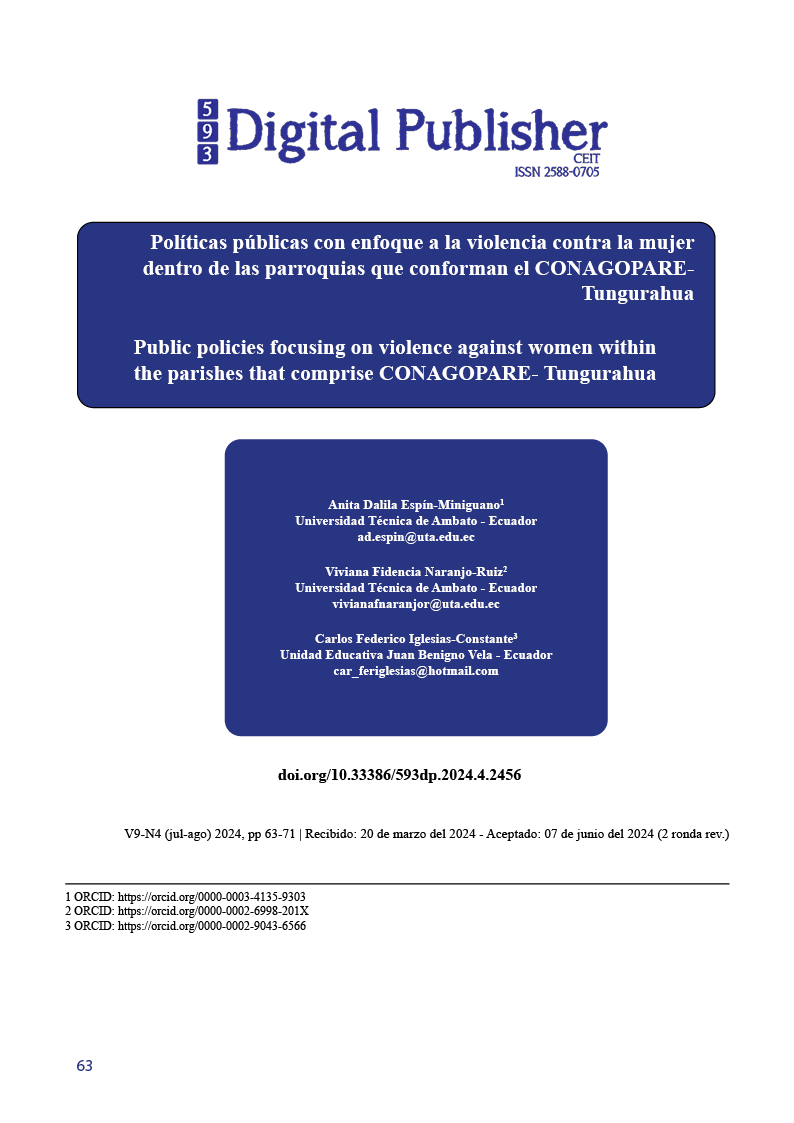Public policies focusing on violence against women within the parishes that comprise CON-AGOPARE- Tungurahua
Main Article Content
Abstract
The purpose of this academic work is to analyze the compliance of public policies focusing on violence against women in the parishes that make up the National Council of Rural Parish Governments of Ecuador - Tungurahua (CONAGOPARE). It aims to determine if adequate measures are being implemented to address cases of gender-based violence within each parish. Information was gathered through field research and analysis of existing public policies, with the aim of promoting a culture of peace and safety for women in these communities. The results show that 49% of the population experiences violence in their homes, with areas such as Santa Rosa, Pinllo, and Río Negro having the highest rates, partly attributed to a lack of information about the reporting processes. Despite these challenges, local authorities are committed to promoting harmony and community participation in initiatives aimed at preventing violence against women. It is concluded that there is a need to intensify actions and improve coordination between authorities and the community to strengthen public policies and promote a culture of respect towards women in these rural communities
Downloads
Article Details

This work is licensed under a Creative Commons Attribution-NonCommercial-ShareAlike 4.0 International License.
1. Derechos de autor
Las obras que se publican en 593 Digital Publisher CEIT están sujetas a los siguientes términos:
1.1. 593 Digital Publisher CEIT, conserva los derechos patrimoniales (copyright) de las obras publicadas, favorece y permite la reutilización de las mismas bajo la licencia Licencia Creative Commons 4.0 de Reconocimiento-NoComercial-CompartirIgual 4.0, por lo cual se pueden copiar, usar, difundir, transmitir y exponer públicamente, siempre que:
1.1.a. Se cite la autoría y fuente original de su publicación (revista, editorial, URL).
1.1.b. No se usen para fines comerciales u onerosos.
1.1.c. Se mencione la existencia y especificaciones de esta licencia de uso.
References
Alberti, M. et al. (2002). “La violencia contra la mujer”. Obtenido de https://psicoterapeutas.com/practica-de-la-terapia-de-aceptacion-y-compromiso/libro-entiende-y-maneja-tu-ansiedad/
Camacho, G. (2020). La violencia de género en contra de las mujeres en Ecuador. págs. 6-9.
file:///Users/anitadalilaespinminiguano/Documents/PE-007-DPE-2020.pdf
CEPAL. (24 de Noviembre de 2020). Preocupa la persistencia de la violencia contra las mujeres y las niñas en la región y su máxima expresión, el feminicidio o femicidio. pág. 7.
Expósito, F., & Moya, M. (2011). Violencia de género. Mente y cerebro, 48(1), 20-25. https://www.academia.edu/download/32507942/Articulo-Violencia-de-genero.pdf
Fischer, F., Miller, G. J., & Sidney, M. S. (Eds.). (2017). Handbook of public policy analysis: Theory, politics, and methods (2nd ed.). CRC Press.
González, C, Alonso, P, & Cano, A (2008). Cultura de paz y no violencia. La defensa personal como propuesta educativa. Revista Internacional de Medicina y Ciencias de la Actividad Física y del Deporte/International Journal of Medicine and Science of Physical Activity and Sport, 8(31), 199-211. https://www.redalyc.org/pdf/542/54222988001.pdf
Hora, L. (25 de noviembre de 2021). Ambato, índices de violencia de género causan preocupación. Obtenido de La Hora : https://www.lahora.com.ec/tungurahua/ambato-indices-de-violencia-de-genero-causan-preocupacion/#:~:text=La%20Fiscal%C3%ADa%20de%20Tungurahua%2C%20en,es%20parte%20de%20la%20estad%C3%ADstica.
Hill, M., & Hupe, P. (2019). Implementing public policy: Governance in theory and practice. Sage.
OMS. ( 2021). Violencia contra la mujer. Recuperado el 8 de marzo del 2021. pág. 4-5
Rojas Bonilla, E. (2018). La cultura de paz y su importancia en el proceso de formación ciudadana en el contexto educativo colombiano. Varona. Revista Científico Metodológica, (66). http://revistas.ucpejv.edu.cu/index.php/rVar/article/view/457
Pautassi, L., & ZIBECCHI, C. (2009). Programas de transferencias condicionadas de ingresos ¿Quién pensó en el cuidado? La experiencia en Argentina. CEPAL, Santiago de Chile.
Rodriguez, G., Zangara, V., & Preedin, G. (2017). La política social para adultos mayores: la intervención profesional y el envejecimiento activo. In X JIDEEP-Jornadas de Investigación, Docencia, Extensión y Ejercicio Profesional (La Plata, 2017).
Santillán, V. P. U., & León, A. A. J. (2021). ¿ Cultura de paz o cultura adversarial en el Distrito Judicial del cantón Loja?. Sociedad & Tecnología.
Solis, S. (13 de Septiembre de 2021). En Ecuador, el 65% de mujeres ha sido víctima de algún tipo de violencia. pág. 46.
TELESUR. (13 de abril de 2020). Autoridades de Ecuador advierten aumento de violencia de género. Obtenido de TELESUR: https://www.telesurtv.net/news/autoridades-ecuador-aumento-violencia-genero20200413-0055.html
Villegas, J. (5 de Mayo de 2021). La violencia contra las mujeres en Ecuador a seis años de los ODS. págs. 3-4
Yugueros, A. (2014). “La violencia de género en el ámbito interdisciplinario”. Obtenido de https://www.redalyc.org/pdf/3221/322132553010.pdf
Velázquez, S. (2003). “Las violencias contra la mujer”. Obtenido de: https://psicoterapeutas.com/trastornos/agresividad/violencia-contra-la-mujer/




